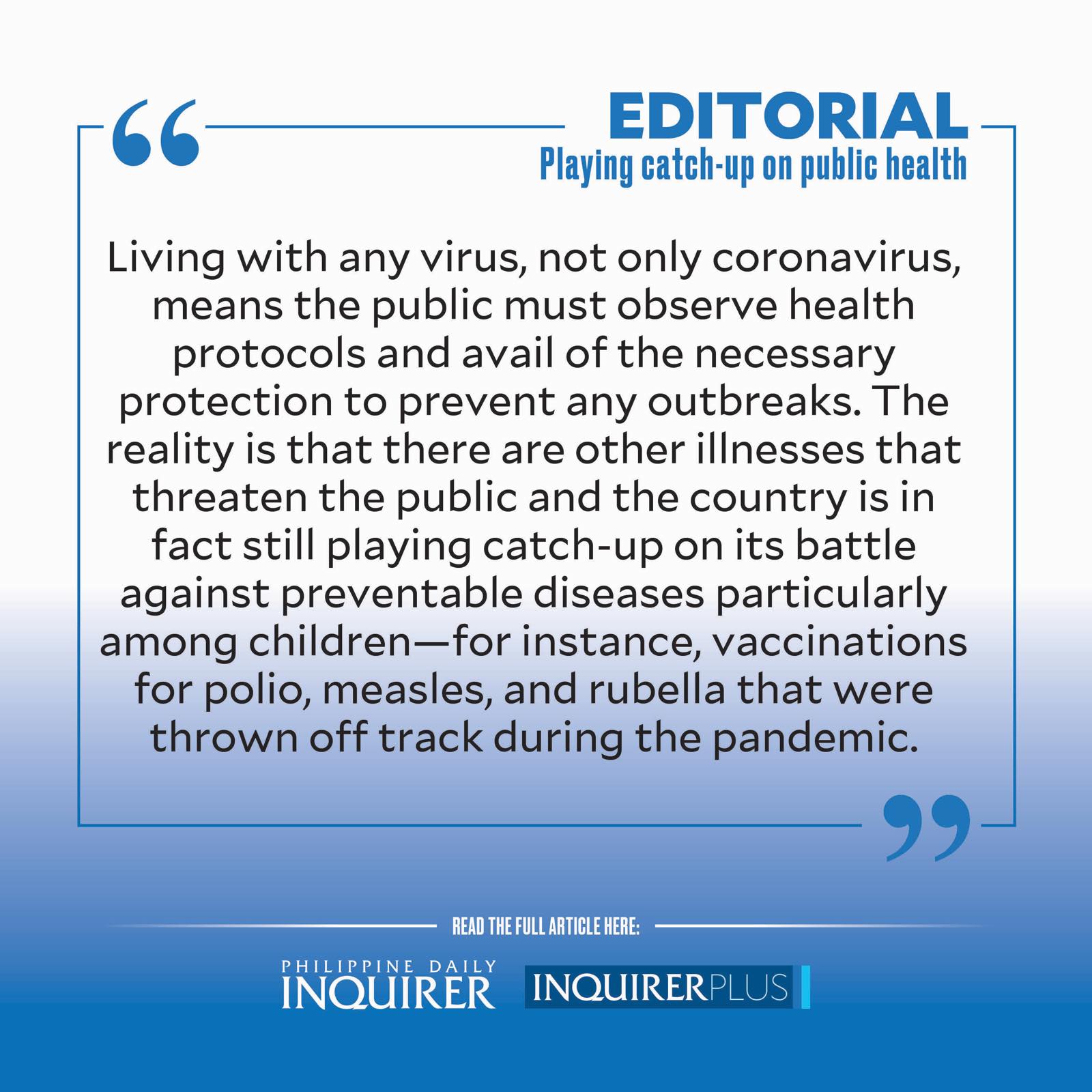Playing catch-up on public health

When the World Health Organization lifted the global health emergency over COVID-19 in May, it did not mean that COVID or other illnesses have ceased to be a threat and it could be an excuse to neglect the public health sector.
Recently, the Department of Health (DOH) observed a rise in flu cases while Singapore has reported a new Omicron subvariant. The good news is, according to the DOH, at least 78 million Filipinos, or the majority of the target population, have been vaccinated against COVID-19. The bad news is that only about 30 percent of that number has received booster shots. It is also a fact that immunity offered by vaccines of any kind does not last forever—for example, the flu vaccine is recommended every year while the pneumonia vaccine every five years. In the case of the COVID-19 vaccines, research showed that their effectiveness—depending on which brand of vaccine—was at the very least halved after a month and dropped further to as low as nine percent after nine months. That the virus has mutated into several subvariants, some more virulent than others, has posed a challenge to scientists in developing an effective COVID-19 vaccine. This would also require repeated booster doses, with public health experts expecting COVID cases to continue to occur especially during respiratory virus seasons when people are more susceptible to colds and flu.President Marcos’ order to lift the state of public health emergency last July meant, however, that the government would only exhaust the remaining stocks of COVID-19 vaccines. It recently completed its rollout of 390,000 bivalent vaccines, and Health Secretary Teodoro Herbosa said there were no plans to acquire more after they were shown to increase antibodies for old strains of the virus. “Apparently, what was discovered was the bivalent is not as effective, because it increases your antibodies to the original [virus], not the [new] ones … In that case, it doesn’t really protect you from the newer variants,” Herbosa said. A new monovalent COVID vaccine has been released in the market targeting the XBB Omicron strain but the government has not decided whether to acquire it and will depend on any increase of cases—a prudent move considering the wastage in public resources that happened in the past due to expired vaccines. In the meantime, Herbosa has advised the public, especially the elderly, to avail of flu shots from the department.
The DOH has reported a 45-percent increase in flu cases this month compared to the previous year, with an increase of 26 percent first recorded in September. Some schools have already shifted to online or blended learning to prevent the spread of the virus among the students, while those who have flu-like symptoms are advised to wear a mask—a measure that was made voluntary by the government last July—when they go to the precincts to vote tomorrow for the barangay and Sangguniang Kabataan elections. The authorities have also recommended mask-wearing, especially for those traveling during the “Undas” holidays—crowded places like airports and bus terminals, as well as enclosed areas such as inside an airplane or vehicle, can become virus clusters where the disease can spread more easily, especially if people are not wearing masks or have not been vaccinated.Living with any virus, not only coronavirus, means the public must observe health protocols and avail of the necessary protection to prevent any outbreaks. The reality is that there are other illnesses that threaten the public and the country is in fact still playing catch-up on its battle against preventable diseases particularly among children—for instance, vaccinations for polio, measles, and rubella that were thrown off track during the pandemic. The Philippines has one million zero-dose children, or those who did not receive a single routine vaccination between 2019 and 2022, the second highest in East Asia and the Pacific and the fifth highest in the world. In addition, Ibon Foundation noted that the 41.1 percent and 17.8 percent slash on the prevention of noncommunicable and communicable diseases, respectively, in the 2024 health budget will have an impact considering that these are the top causes of death and morbidity. It makes no sense then to cut their budgets for next year when there are malaria and dengue outbreaks, rising HIV cases, and high tuberculosis cases, among others.
The Marcos administration must reverse this neglect of the public health sector and pick up the slack in vaccination against prevailing diseases. With the COVID-19 emergency over, all the more reason that the government should now shift much-needed resources to other aspects that would benefit the public’s health.




















